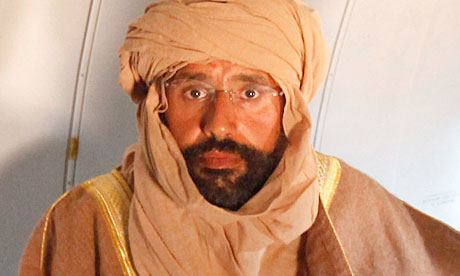
WATCHING the extraordinarily rambling and repetitive speech by Colonel Muammar Gaddafi’s 38-year-old second son, Saif al-Islam Gaddafi, on Libyan television on Sunday night, I couldn’t help being struck by how ignorant the man was.
According to Saif, the protests in Libya are the work of drunks, criminals and foreigners who had been paid to destabilise the Libyan state. (“At this time drunks are driving tanks in central Benghazi.”) If everybody does not rally around the regime, there will be a terrible civil war. (“We are a tribal people.”) The country will break into a dozen separate emirates, all foreign investors will leave, and the oil will cease to flow.
Bereft of its oil income, Libya will have to close its hospitals and schools. Everybody will fall into a poverty so deep that it will take 40 years to climb back out. The Americans and the British will take over the country. There will be a great plague, and it will rain frogs and spiders.
I made up that last bit, but he really said the rest of it. How can he imagine that Libyans will simply swallow this stuff? The regime doesn’t let them travel and state censorship is fierce, but Libyans are literate people and they are not fools. Saif’s threats will not persuade them — and neither will his promises.
He offered the concessions that are typical at this stage in the collapse of an Arab regime. There will be a great public consultation to discuss the country’s future, including a new constitution. Salaries of government employees will be doubled. If the people will just stop protesting, everything can change — except, of course, the regime itself.
- Chamisa under fire over US$120K donation
- Mavhunga puts DeMbare into Chibuku quarterfinals
- Pension funds bet on Cabora Bassa oilfields
- Councils defy govt fire tender directive
Keep Reading
Gaddafi’s son’s speech sounded just like the final television speeches made by Egypt’s former president Hosni Mubarak and Tunisia’s ex-president Zine El Abidine Ben Ali before they fled their respective capitals, so it probably won’t be long now. The Gaddafi regime has already lost control of the eastern part of the country, and on Sunday the street protests spread west to Tripoli.
Saif al-Islam would not do well in exile; the money would not be consolation enough. He does actually care about the country, and he doesn’t understand why its people do not love him and his family back. Whereas his father Muammar, if he makes it out safely, will survive with his ego quite undented.
Forty-one years of absolute power have so shaped the character of the Clown Prince of Arab dictators that nothing can now shake his vainglorious self-regard. Even when the Libyans finally reject him, he will see it as their loss, not his. He never was very bright.
Prince Salman bin Hamad al-Khalifa, heir to the throne of Bahrain, is playing a very different game. It was he who ordered the army to leave Pearl Square in Manama, the capital, on Sunday, two days after four protesters were killed and 231 wounded in a military night attack to clear the square. He understands that the survival of the monarchy now depends on persuading the majority of Bahrainis that the promise of fundamental reform is real.
He doesn’t yet control the riot police, who wounded several dozen more people with shotgun fire before they abandoned the square to the returning protesters on Sunday. So he hasn’t yet won the battle within the royal family over what to do next — but he probably will, for it faces the threat of a republican revolution in Bahrain.
The great difference between Gaddafi in Libya and the ruling families of all the other oil-rich Arab states is that they have the option of retreating into constitutional monarchy. Gaddafi can only rule or flee, but the al-Khalifas can make a deal.
The opposition parties have agreed to open talks with Prince Salman if he meets their demands: the current government must resign, political prisoners must be released, and the killing of protesters must be investigated. All those things will happen, and then the haggling will begin.
The protesters do not want more killing and they certainly don’t want to damage the tiny country’s wealth. (Bahrain’s 800 000 residents enjoy a per capita annual income of US$25 000). But they do want an end to the disadvantages suffered by the 70% Shia majority in a state ruled by a Sunni royal family. They also want a real democracy, not the current halfway house.
Such a regime would be a frightening anomaly in a region otherwise ruled by absolute monarchies, but retaining Bahrain’s royal family would mollify the neighbours greatly. In Bahrain there is unlikely to be any further bloodshed, and the outcome will probably be a constitutional compromise.
In Libya, however, there might be more blood and no compromise. As Saif al-Islam Gaddafi warned in his epic rant: “You will see worse than Yugoslavia…The army is not the army of Egypt or Tunisia. They will support Gaddafi to the last minute…60 years ago they defended Libya from the colonialists; now they will defend it from drug addicts. We will fight to the last man and woman and bullet.”
Or alternatively, the regular army may simply force Gaddafi’s praetorian guard to surrender in Tripoli, as it has apparently already done in Benghazi.
It could be over in Libya quite soon, as the old Arab order continues to unravel.
Gwynne Dyer is a London-based independent journalist.











